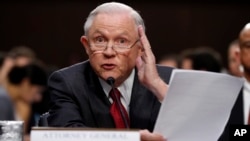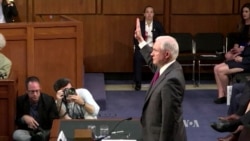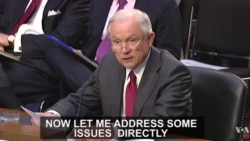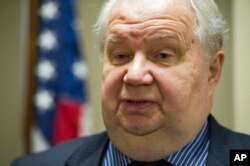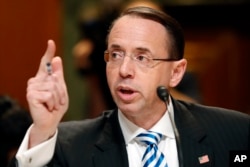U.S. Attorney General Jeff Sessions on Tuesday denied having an undisclosed meeting with Russia's ambassador to Washington or improper communications with other foreign officials, saying the notion that he colluded with Russian officials during last year's presidential election was an "appalling and detestable lie."
In a heated testimony before the Senate Intelligence Committee investigating Russian meddling in the election, Sessions, who was an adviser to President Donald Trump's 2016 president campaign, said he met twice with Russian Ambassador Sergey Kislyak last year, but he denied reports that he had a third undisclosed meeting with Kislyak at a Washington hotel last April.
"Let me state this clearly: I have never met with or had any conversations with any Russians or any foreign officials concerning any type of interference with any campaign or election," Sessions said.
But Sessions frequently framed his answers with "to the best of my knowledge" qualifiers and left open the possibility that he had a casual encounter with Kislyak at a reception preceding a foreign policy speech by Trump at the Washington Mayflower Hotel.
"If any brief interaction occurred in passing with the Russian ambassador during that reception, I do not remember it," Sessions said.
To 'address matters'
The testimony, Sessions' first since he recused himself from oversight of the Russia probe in March following reports of his meetings with Kislyak, came after new reports that the former senator may have had a third undisclosed meeting with the Russian diplomat.
Going into the testimony, Sessions said he wanted to address questions raised by ousted FBI Director James Comey during his testimony before the same panel last week.
A Sessions spokeswoman later said the attorney general had requested the meeting be open, adding that he looked "forward to answering the committee's questions."
But Tuesday's hearing grew testy as Sessions refused to answer questions about his conversations with Trump, drawing charges of stonewalling from Democrats on the panel.
Asked by Democratic Senator Dianne Feinstein if he had discussed Comey's handling of the Russia investigation with Trump or any other official, Sessions said, "I'm not able to comment on that."
Asked by Republican Senator Marco Rubio about a February 14 Oval Office with Trump, Sessions responded, "That's a communication in the White House that I'd not comment on."
In dodging questions about his private conversations with Trump, Sessions invoked a “long-standing” Department of Justice policy of not commenting on confidential conversations between the attorney general and the president rather than executive privilege.
Republican Senator James Lankford of Oklahoma defended Sessions' reticence, arguing that Obama administration officials had similarly withheld information, but Democrats were infuriated.
"You raised your right hand here today and said you would solemnly swear to tell the truth, the whole truth and nothing but the truth," Democratic Senator Martin Heinrich of New Mexico said. "Now you're not answering questions. You're impeding this investigation."
Unaware of policy
Former Department of Justice officials said they were not aware of such a policy.
"If there is a long-standing Department of Justice policy requiring it, I'm unfamiliar with that policy," said David Sklansky, a former federal prosecutor who is now a professor at Stanford University Law School.
Laurie Levenson, another former Department of Justice official, said she was unfamiliar with the policy, saying, "There has to be follow-up by Congress."
Comey's hearing
Sessions appeared before the intelligence committee five days after Comey, the former FBI director, delivered a dramatic testimony of his own before the same panel, accusing Trump of initiating improper one-on-one communications with him and trying to get him to drop an investigation into former National Security Advisor Michael Flynn.
Comey testified that he later voiced concern about his meeting with Trump to Sessions, but that Sessions failed to respond.
Sessions corroborated Comey's account, but he said he saw “nothing improper” for the president to meet alone with the FBI director and that he advised him to follow Department of Justice protocols in communicating with the White House and the president.
The attorney general recused himself from the Russia investigation in early March after reports emerged that he’d failed to disclose his contacts with the Russian ambassador during his confirmation hearings in January.
In his testimony, however, Sessions said he’d not received any detailed briefing on Russian interference in the election and that recused himself not because of “any wrongdoing,” but because Department of Justice rules prohibiting his involvement as a former Trump campaign adviser.
However, his recusal from the Russia probe did not mean he couldn’t be involved in Trump’s controversial decision to fire Comey, Sessions testified.
"It is absurd, frankly, to suggestion a recusal from a single specific investigation would render an attorney general unable to manage the leadership of the various Department of Justice law enforcement components that conduct thousands of investigations," Sessions said.
In announcing Comey's dismissal last month, Trump initially said he was acting on the recommendations of Sessions and Deputy Attorney General Rod Rosenstein.
But Trump later told a television interviewer that he'd fired Comey over his handling of the Russia investigation.
No new clues
Levenson, who now teaches law at Loyola Law School in Los Angeles, said Sessions' testimony did not offer new clues into Russian interference in the election or the events leading up to Trump's firing of Comey.
"He did corroborate some of what Comey said," she said. "He tried not to be in conflict. Beyond that, we learned nothing."
She said partisanship pervaded the testimony. "The Republicans seem bent on saying, 'There is nothing here to be investigating; this is unfair; the president has the right to do this,' and the Democrats [on] saying, 'We're not satisfied; we don't have all the facts.' "
To Sklansky, the testimony raised more questions.
"It deepens the mystery about whether there were additional facts about Sessions that can't be discussed publicly that suggested that he needed to recuse himself," he said. "It also left us in a positon where it seems the only way the full facts will come out regarding Comey's dismissal is if Sessions is forced to answer questions. That may require a subpoena of some kind."




